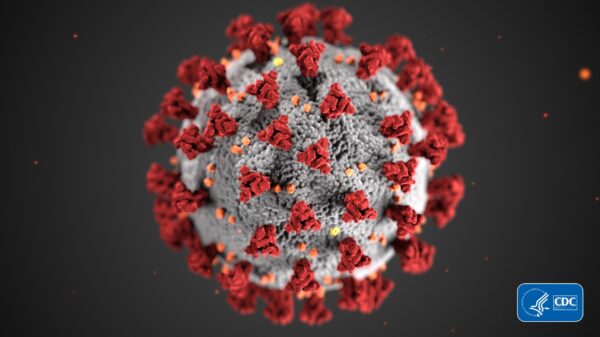
This illustration, created at the Centers for Disease Control and Prevention (CDC), reveals ultrastructural morphology exhibited by coronaviruses
A company developing a drug derived from the blood thinner heparin for a form of leukemia is planning to test it in patients with Covid-19 due to its anti-inflammatory and anti-clotting properties.
Durham, North Carolina-based Chimerix said Wednesday that it would initiate a Phase II/III trial of dociparstat sodium, or DSTAT, in Covid-19 patients with acute lung injury. The company said DSTAT can substantially reduce the risk of bleeding complications associated with heparin, in addition to having anti-inflammatory properties and potential to address underlying causes of coagulation disorders.

Behavioral Health, Interoperability and eConsent: Meeting the Demands of CMS Final Rule Compliance
In a webinar on April 16 at 1pm ET, Aneesh Chopra will moderate a discussion with executives from DocuSign, Velatura, and behavioral health providers on eConsent, health information exchange and compliance with the CMS Final Rule on interoperability.
The latter property could be important in Covid-19, which, in addition to causing potentially fatal cytokine storms, has also been linked to embolisms and strokes, even in patients who are young and who have mild to moderate disease. Both symptoms have been linked to the body mounting an overactive immune response. Studies have shown that low platelet counts and high red-white blood cell ratios are clinically relevant indicators of disease severity and mortality in Covid-19, the company said. As part of an ordinary immune response, red blood cells can form neutrophil extracellular traps, or NETs, but when those are produced in excess, they can be pathogenic, which appears to be the case in Covid-19.
DSTAT works by inhibiting a protein called HMGB1, which both induces downstream inflammatory cytokines like IL-6, TNF-alpha and others that are elevated in Covid-19, as well as promoting NETs.
“As opposed to targeting just IL-6, you’re going to target multiple downstream cytokines, which gives broader blocking of that cytokine storm,” Chimerix CEO Mike Sherman said in a phone interview.
Several drugs that target inflammatory cytokines are in clinical development for Covid-19, including anti-IL-6 monoclonal antibodies like Roche’s Actemra (tocilizumab) and Regeneron Pharmaceuticals and Sanofi’s Kevzara (sarilumab). Meanwhile, AstraZeneca is running a Phase III trial in Covid-19 of Calquence (acalabrutinib), a blood cancer drug that is also considered to have upstream activity against multiple cytokines by inhibiting BTK, a kinase that regulates them.

A Deep-dive Into Specialty Pharma
A specialty drug is a class of prescription medications used to treat complex, chronic or rare medical conditions. Although this classification was originally intended to define the treatment of rare, also termed “orphan” diseases, affecting fewer than 200,000 people in the US, more recently, specialty drugs have emerged as the cornerstone of treatment for chronic and complex diseases such as cancer, autoimmune conditions, diabetes, hepatitis C, and HIV/AIDS.
The Phase II portion of Chimerix’s study will enroll 74 patients, including 24 to confirm the maximum tolerated dose and 50 who will be tested at the selected dose. The Phase III portion will enroll 450 patients.
Sherman said that because of the recent success of Gilead Sciences’ antiviral drug remdesivir and the likelihood that it will become a standard of care for Covid-19, patients in Chimerix’s study will not likely be excluded if they have received that drug, despite clinical trials generally excluding patients who are receiving other investigational therapies. However, other anti-inflammatory drugs will not likely be allowed.
In other news, the company said last Tuesday that it had received clearance from the Food and Drug Administration to start a rolling submission seeking approval for brincidofovir as a medical countermeasure for smallpox, which it plans to start this month and complete in the middle of the year. The drug would be placed in the National Strategic Stockpile if approved, for use in the event of a smallpox outbreak due to a terrorist attack or accident. The drug was developed under a partnership with the Department of Health and Human Services’ Biomedical Advanced Research and Development Authority.
Photo: Centers for Disease Control and Prevention












